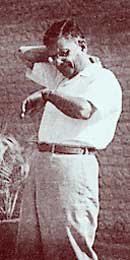|
|
| Fear or favour? |
GANDHI’S PRISONER? THE LIFE OF GANDHI’S SON ANILAL
By Uma Dhupelia-Mesthrie,
Permanent Black, Rs 795
He may be the ?Father of the Nation?, but Mohandas Karamchand Gandhi did not have an easy relationship with his family, especially his four sons. Gandhi?s biographer, Louis Fischer, is scathing in his assessment of Gandhi as a father and husband: ?From young manhood, he was sweet and kind towards everybody except his wife and sons?. The recent play, Mahatma vs Gandhi, went into the conflicts with Harilal, the eldest, who rebelled and ran away. Later, he took to drinking, went to prostitutes and converted to Islam.
But what was Gandhi?s relationship with his second son, Manilal, who is perhaps the true heir to his spiritual and political legacy? It was Manilal who carried on the struggle that Gandhi had started against the discrimination of coloured people in South Africa, it was he who continued with the Indian Opinion, the newspaper Gandhi founded in 1904, and kept alive Phoenix Settlement, Gandhi?s first experiment with communal living. But did Manilal have a choice in the directions his life took?
Or was he Gandhi?s prisoner? The phrase is taken from a letter Gandhi wrote to Manilal in 1918, ?You are not my prisoner, but my friend?you may think over what I say and then act as seems best to you.? But by framing it as a question, Uma Mesthrie, Manilal?s grand-daughter, asks the reader to judge whether this freedom was not illusory. Manilal?s children had no doubts that their father was ?enslaved?. For frequently, Manilal did exactly as his father desired. But was his acquiescence the result of the force of Gandhi?s personality, Manilal?s filial piety or admiration for his father, or even fear? For Gandhi went on fasts to protest against his sons? deviations from the path he had set for them.
Undoubtedly, his father cast a long shadow over Manilal?s life, and sought to control every aspect of it. Even little pleasures were forbidden ? Manilal could not learn the piano just as he couldn?t go on a weekend expedition to the Table Mountains. Most important, Manilal couldn?t go to school because his father considered formal education of no worth compared to what he could learn in ?bapu?s class?. Thus, all Manilal?s dreams of getting on in life with the help of a good education (as his father had done) were frustrated. This left behind an abiding lack of self-confidence in his abilities that plagued him for much of his youth.
Not all edicts were based on principle, however. Gandhi?s objection to Manilal marrying Fatima Gool, a Muslim girl, seem to have expediency as its motivation. How would the couple manage their religious differences? Would one convert? Because if they didn?t ?it will be like putting two swords in one sheath?. For a man who had brought up his children to believe that all religions were equal, this was surprising. It says a lot about the strength of Manilal?s feelings for his father that he not only bore no grudge against him for the decision, but also went on to marry Sushila, whom his parents chose for him.
But it is in his politics that Gandhi influenced Manilal the most. Non-violence, individual discipline and moral development remained Manilal?s credo until the last, and he seemed incapable of resolving these with the directions the anti-apartheid movement took as it gathered steam in South Africa. The result was that he was rendered increasingly irrelevant and isolated from the movement that his abhorrence of injustice should have made him a prominent member of. Manilal?s tragedy was that he remained Gandhi?s son till the end.











